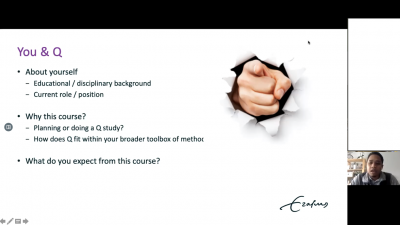- Graduate School GLOMAR
- PhD student reports
- Other activities
- Rifki Furqan
Rifki Furqan
Report of GLOMAR PhD student Rifki Furqan about his participation in the "Q-methodology online course" at the Erasmus Graduate School of Social Sciences and the Humanities, Erasmus Rotterdam University, the Netherlands from 10 - 17 February 2021
This year the Erasmus Graduate School of Social Sciences and the Humanities, Erasmus Rotterdam University, the Netherlands offered an online Q methodology course (introductory level). The online course was taking place from 10 to 17 February 2021. In the previous year, this course was held offline thus allow all participants to interact and discuss directly their case study during the course. However, by having this course online, it allowed participants across time zone which was really great to expand our network. We had a participant from Sydney, Australia and Nottingham, UK.
The course was held in four separated days. We spent 6 hours every day in front of screen as the instructor, Prof. Job van Exel, shared his screen with Zoom meeting. Job van Exel is a professor at the Erasmus School of Economics and the Erasmus School of Health Policy & Management. He has been used and published on Q methodology for more than ten years.
Q-methodology is an innovative mixed-method which enables systematic categorization of people’s perceptions about a particular topic from both a qualitative and quantitative approach. I am going to use this method for my PhD work. I am assessing sustainability factors of Territorial User Rights for Fisheries management from the stakeholder’s perspective and try to depict their views on the stewardship behaviors.
These sessions included a mix of lectures, demonstrations and several exercises. There were four sessions, the first session was on Wednesday 10th, we learnt an introduction of Q methodology. I gain knowledge about what is it and what can we do with the method. By the end of that day, every participant pitched their work and answered question: why I used Q method and how it worked out for me. The instructor sent us several reading materials as our additional source of knowledge.
The second session was on Thursday 11th, we learnt about study design and data collection procedure. Specifically, we taught how to develop the study materials, and how to collect data. There was a voluntary assignment to close this session, which was to conduct an interview as part of data collection simulation.
The third session was on Monday 15th, we focused on data analysis and interpretation. I learnt about how to administer and analyze Q data and how to interpret it. We run a data analysis simulation with PQMethod, a software analysis dedicated to Q method. Some participants were bringing their data and discuss it openly.
Last session was on Wednesday 17th, we had our reflection and open discussion regarding our case study. It was kind of wrap up session which allowed us to share and discuss anything related to our work. It was really useful for me as I posed several questions regarding my work.
I really appreciate the funding support from GLOMAR so I can have an opportunity to learn Q methodology and expanding my network among early researcher who are using Q methodology. I am going to implement Q methodology as my core methodological approach in my PhD work. Thus, the course is very useful for me.



